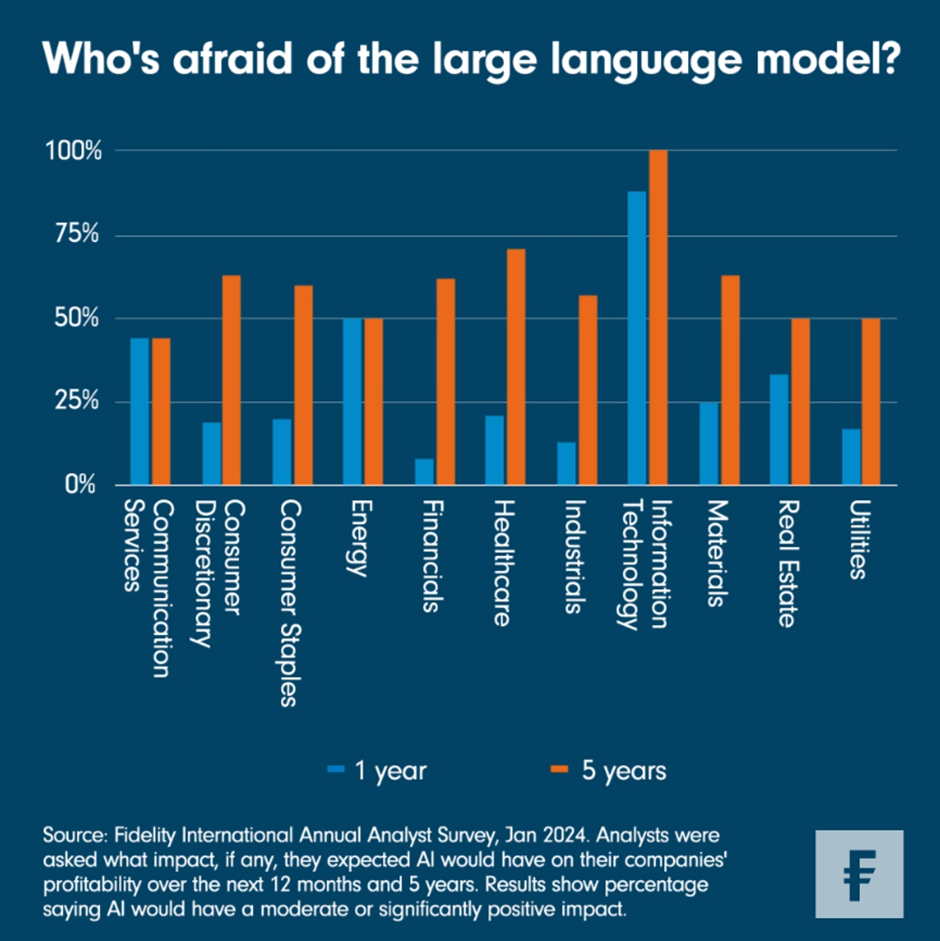Who's afraid of the large language model?

"I can build these cool demos, but where's the real value?"1 So spoke tech entrepreneur and chief executive Matthew Prince when summing up the corporate mood on artificial intelligence at Davos in January.
The results of Fidelity’s annual Analyst Survey, released this week, go some way to answering Mr Prince’s question. The responses from 137 cross-asset and cross-sector analysts from all over the world provide a handful of telling insights on companies’ approach to the new breed of tech, a year on from the explosion of interest caused by the launch of ChatGPT.
Firstly, relatively few of Fidelity’s analysts covering names outside of the tech sector expect their companies to make any money out of artificial intelligence (AI) in the immediate future. However, spin the timeline out to five years and a majority in most sectors say AI will have a moderate or significant impact on corporate profits.
Exactly how is more difficult to say, but there are hints.
“Nobody is satisfied with where they are in digital transformation, even those who are ahead.”
Cyber security is one. When asked to name the single biggest step management teams are taking to make their businesses more robust, some 63 per cent of analysts cite investing in technology. That comes ahead of strengthening balance sheets, investing in employees, or putting cash aside for a rainy day.
In the banking sector, for example, where there are fears of a wave of AI-assisted fraud, an arms race has begun to get ahead of the criminals with AI-powered defence systems. That plays into the general trend in the sector of investing strongly in technology upgrades.
“Nobody is satisfied with where they are in digital transformation, even those who are ahead,” says Serene Darwish, an equity analyst at Fidelity who covers financial companies in emerging markets. “Pretty much everyone expects steady investment.”
Other analysts see opportunities for materials, healthcare, and consumer discretionary companies.
“Pharmaceuticals companies will use AI to enable drug discovery,” says healthcare analyst Emma Newey Clark.
The bulk of the use cases the survey points to are plain vanilla: AI will help cut costs. That might mean simplifying administrative processes in the health or banking sectors, fleet management in logistics, or improving an airline’s pricing systems.
Such efficiencies will often equal job cuts. But it will take time, and the broader social implications - and their impact on net demand - are unclear at best.
“AI could benefit telecoms companies in terms of their outage management systems but it will also be a costly investment,” says Annie Liu, who covers communications services firms in the Asia Pacific region. “Ultimately, technological disruption could lead to the telco revenue pool shrinking.”
The message from our analysts is clear: AI may be mostly cool demos right now, but that will change quickly. Whether you’re afraid of AI or not, ignore it at your peril.
